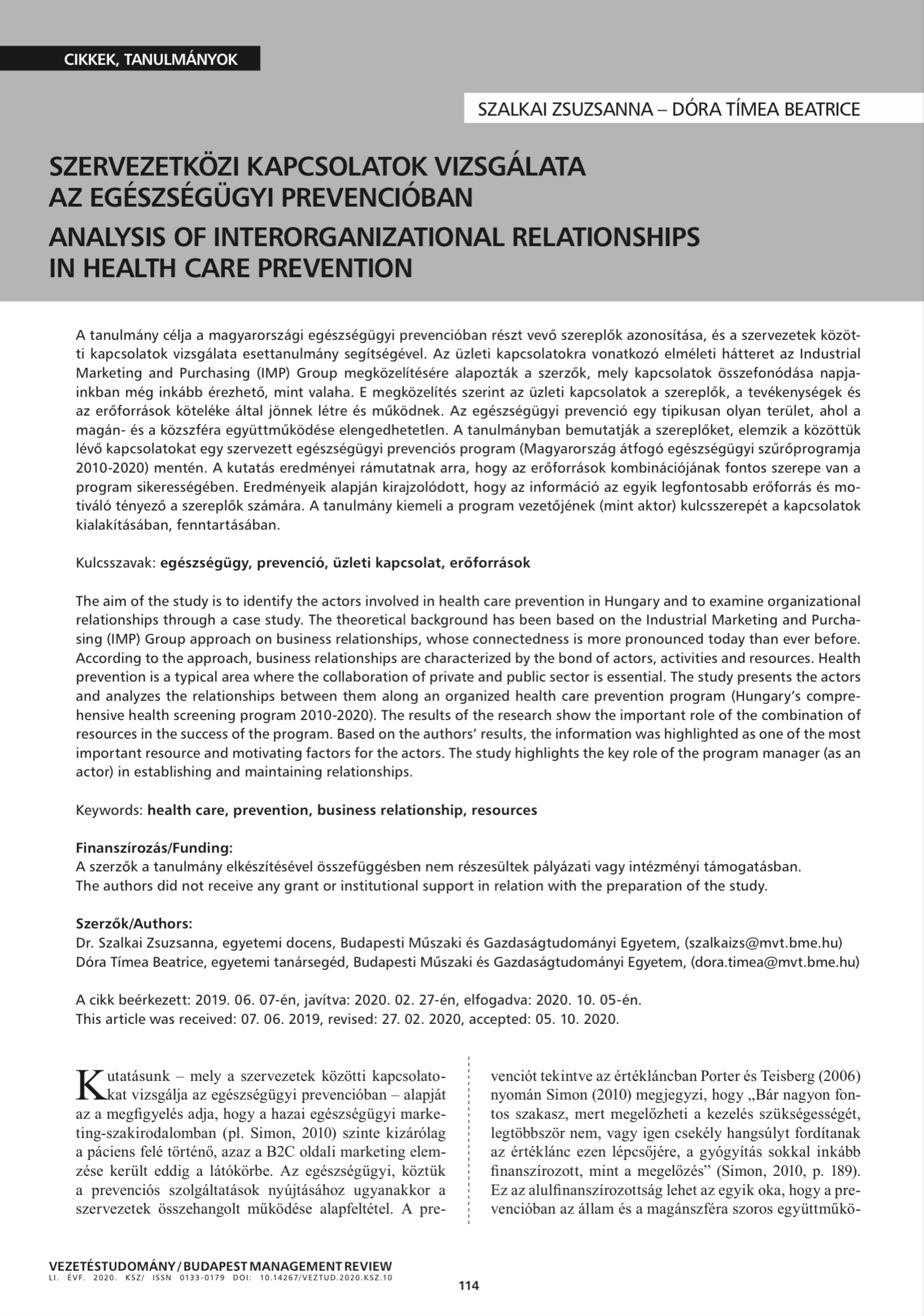Szervezetközi kapcsolatok vizsgálata az egészségügyi prevencióban
DOI:
https://doi.org/10.14267/VEZTUD.2020.KSZ.10Keywords:
healthcare, prevention, business relationship, resourcesAbstract
The aim of the study is to identify the actors involved in health care prevention in Hungary and to examine organizational relationships through a case study. The theoretical background has been based on the Industrial Marketing and Purchasing (IMP) Group approach on business relationships, whose connectedness is more pronounced today than ever before. According to the approach, business relationships are characterized by the bond of actors, activities and resources. Health prevention is a typical area where the collaboration of private and public sector is essential. The study presents the actors and analyzes the relationships between them along an organized health care prevention program (Hungary’s comprehensive health screening program 2010-2020). The results of the research show the important role of the combination of resources in the success of the program. Based on the authors’ results, the information was highlighted as one of the most important resource and motivating factors for the actors. The study highlights the key role of the program manager (as an actor) in establishing and maintaining relationships.
Downloads
References
Abrahamsen, M.H., Havenvid, M.I., & La Rocca, A. (2017). Researching the Interactive Business Landscape. In Håkansson, H. & Snehota, I. (eds.), No business is an island: Making Sense of the Interactive Business World (pp. 253-273). London: Emerald Publishing.
Ádány, R. (ed.) (2012). Megelőző orvostan és népegészségtan. Budapest: Medicina Kiadó.
Antal, Zs. (2018). A közszolgálati kommunikáció eredményességére ható tényezők: A közszféra és a versenyszféra kommunikációs gyakorlatát befolyásoló különbségek. Vezetéstudomány, 49(4), 68-76. https://doi.org/10.14267/VEZTUD.2018.04.07
Barna, I., Daiki, T., Kékes, E., & Dankovics, G. (2019). Magyarország átfogó egészségvédelmi szűrőprogramja 2010-2020-2030 (MÁESZ) eredményei 2010-2018, az első kilenc év’. Lege Artis Medicinae, 29(3), 111-119. https://doi.org/10.33616/lam.29.012
Bazzoli, G.J., Stein, R., Alexander, J.A., Conrad, D.A., Sofaer, Sh., & Shortell, S.M. (1997). Public-Private Collaboration in Health ad Human Service Delivery: Evidence from Community Partnerships. The Milbank Quarterly, 75(4), 533-561. https://doi.org/10.1111/1468-0009.00068
Bódi-Schubert A. (2011). A vevő-beszállító kapcsolat elméleti megközelítései és empirikus szemléltetésük. Vezetéstudomány, 42(2), 58-70.
Caplan, G. (1964). Principles of preventive psychiatry. Oxford, England: Basic Books.
Chandra, A., Acosta, J.D., Carman, K.G., Dubowitz, T., Leviton, L., Martin, L.T., Miller, C., …Plough, A.L. (2016). Fostering Cross-Sector Collaboration to Improve Well-Being. In Building a National Culture of Health (pp. 62-81). RAND Corporation. Retrieved from www.jstor.org/stable/10.7249/j.ctt1b67wjh.14
Dematron Health Service (2018). Egészség Könyv: Magyarország átfogó egészségvédelmi szűrőprogramja (pp. 1-8).
Dubois, A. & Araujo, L. (2004). Research methods in industrial marketing studies. In Håkansson, H., Harrison, D., & Waluszewski, A. (eds.), Rethinking marketing – Developing a new understanding of markets (pp. 207-227). Chichester: John Wiley & Sons.
Ford, D. (2003). Business marketing. Budapest: KJK Kerszöv.
Gelei A., Dobos I., & Bódi-Schubert A. (2016). Üzleti kapcsolatok kutatása. Budapest: Akadémiai Kiadó.
Håkansson, H. (ed.) (1982). International marketing and purchasing of industrial goods: An interaction approach. Chichester: Wiley.
Håkansson, H. & Snehota I. (eds.) (1995). Developing relationships in business networks. London & New York: Routledge.
Håkansson, H., Ford, D., Gadde, L., Snehota, I. & Walusewski, A. (2009). Business in networks. Chichester: John Wiley & Sons.
Håkansson, H., & Waluszewski, A. (2002). Managing Technological Development, IKEA, the Environment and Technology. London: Routledge.
Johnson, R. P. & Indvik, J. (1999). Organizational benefits of having emotionally intelligent managers and employees. Journal of Workplace Learning, 11(3), 84-88. https://doi.org/10.1108/13665629910264226
KSH (2018). Egészségügyi kiadások alakulása (2003–). Kimutatás száma:2.4.1. Retrieved from https://www.ksh.hu/docs/hun/xstadat/xstadat_eves/i_fec001a.html
Mandják T. (2005). Marketing-szemléletmód és az ületi kapcsolatok. Vezetéstudomány, 36(5), 14-24.
Porter, M.E. & Teisberg, E.O. (2006). Redefining health care – Creating value-based competition on results. Boston, Mass: Harvard Business School Press.
Simon J. (2010). Marketing az egészségügyben. Budapest: Akadémiai Kiadó.
Simon J., Mandják T., & Szalkai Zs. (2011). Különböző beszerzői magatartásminták a magyarországi kórházak körében. Vezetéstudomány, 42(2), 21-32.
Sylvia, D.R. & Sylvia, M.K. (2012). Program Planning and Evaluation for the Public Manager. New York: Waveland Press.
Vokó, Z. & Kaló Z. (2012). Prevenció – kiadások – hatékonyság. Egészségügyi Gazdasági Szemle, 50(1), 6-8.

Downloads
Published
How to Cite
Issue
Section
License
Authors assign copyright to Vezetéstudomány / Budapest Management Review. Authors are responsible for permission to reproduce copyright material from other sources.

